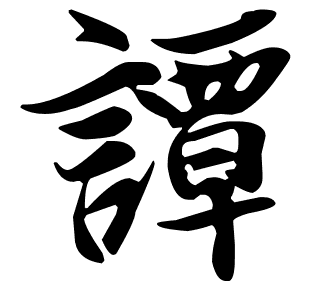Origins

Mok may transcribe the pronunciation, in different varieties of Chinese, of some Chinese surnames spelled as Mo or Mu in Pinyin (which reflects the Mandarin Chinese pronunciation), including:
- Mò ( 莫 ), spelled Mok based on its pronunciation in Cantonese (Jyutping :Mok6; Cantonese Yale :Mohk; IPA: /mɔːk̚²/) or Teochew (Peng'im: Mog8; IPA: /mok̚⁴/). [1] [2]
- Mù ( 穆 ), homophonous with the first surname above in Teochew. [3] According to Patrick Hanks, some Cantonese speakers in the United Kingdom and the United States also spell this name as Mok, though Muk is probably a more common transcription of the Cantonese pronunciation (Jyutping:Muk6; Cantonese Yale:Muhk; IPA: /mʊk̚²/). [1] [4]
- Mù ( 牧 ), homophonous with the first surname above in Teochew. [5]
- Mù ( 睦 ), homophonous with the first surname above in Teochew. [6]
The Dutch surname Mok is a variant spelling of Mock. [1] The surname Mock might have originated from Moch, a clipping of Mochel (mohel). [7]
The Hungarian surname Mók was originally a given name. That given name might be a hypocorism of Mózes, which is the Hungarian form of the given names Moises or Moses. [1]
There is only one hanja used to write the modern Korean surname Mok: Hwamokhal Mok ( 睦 ; 화목할 목), meaning 'harmonious'. The bearers of this surname are almost all members of the Sacheon Mok clan . That clan is so named for its bon-gwan (clan hometown) of Sacheon, South Gyeongsang Province, a city which became part of South Korea after the division of the Korean peninsula. Its members claim descent from Mok Hyo-gi , an official under Gojong of Goryeo. [8] [9] Historically, another hanja meaning 'tree' (木; 나무 목;Namu Mok) had also been used as a surname by the Mok clan of Baekje, but this surname is no longer extant in the Korean peninsula.



